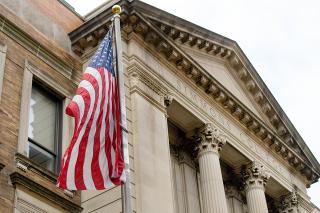Sometimes what happens outside of the classroom is as significant as the learning inside it. Consider Associate Professor Abbie Frost’s social work course, “Social Action for Military Families.” In 2017, two veterans in that class — William Delaney (US Marines) and Kenneth MacIntosh (US Navy) formed a Student Veterans of America (SVA) chapter — the first ever in a social work school. With Frost as their advisor, they petitioned for a charter and established the group, resulting in Delaney becoming the president and MacIntosh the vice president.
The original focus was about peer support, recalls Delaney, “We had a lot of things to talk about.” Those things included the transition from military service to an academic setting. It turns out that the transition is as diverse as the individuals themselves. Some come directly from military service; others from undergraduate programs; and still others from community colleges.
While the majority of SVA chapters nationally are focused on the undergrad population, the Simmons chapter, housed in the Master of Social Work graduate program, is open to all students, at whatever stage in their academic lives. What bonds all the members, though, is their pursuit of social work precisely because of their military experience. As Frost points out, one advantage of the program living in the Simmons School of Social Work is that “Through their interests and training, veterans are in a good place to provide team support and recognize the importance of mental health.”
Ultimately the peer support evolved into other topics, such as sharing best practices, discussing field placements and identifying what makes them marketable as social workers. Perhaps most importantly the group recognized that inclusion was a priority and thus the group is open to anyone with an interest in supporting military veterans — family members, friends and community members.
The group is now approximately 20 people strong and growing — both in numbers and in their attention to other inclusion issues, such as accessibility rights. With the addition of a newly created veteran’s coordinator position working out of Enrollment Management to support recruitment and retention, this growth will continue, which prompts Delaney to note that he “couldn’t be happier.” And although Delaney is graduating in 2019 and passing the presidential baton to Sharalis Canales, Class of 2020, he will continue to play a role as an alum.

